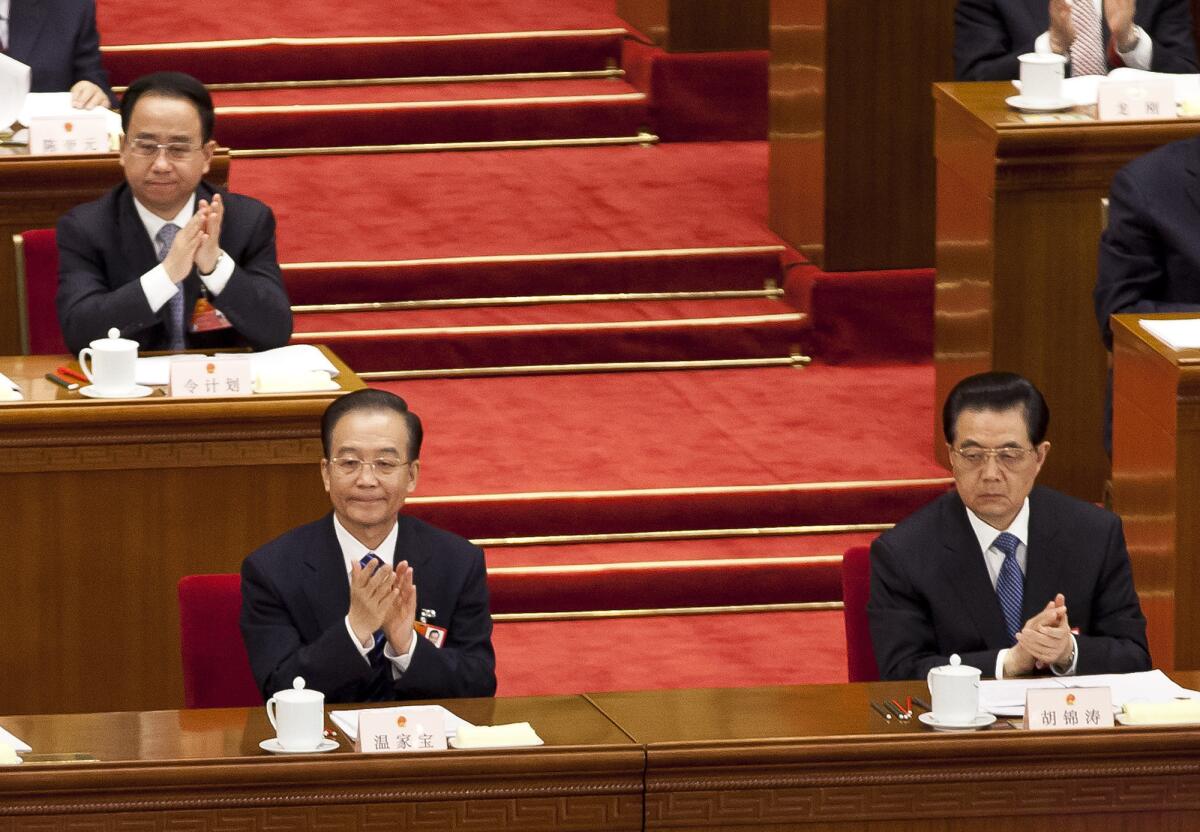In Chinese corruption case that began with Ferrari crash, former top official faces prosecution

Ling Jihua, top left, an aide and confidant to then-President Hu Jintao, bottom right, attends a plenary session of the National People’s Congress at the Great Hall of the People in Beijing on March 11, 2012.
Reporting from Beijing — Former Chinese President Hu Jintao’s onetime top aide, who was sidelined from the upper echelons of power in 2012 after his son died in a spectacular Ferrari crash, has been expelled from the Communist Party and referred to courts for prosecution, state-run media said Monday.
Party investigators found that Ling Jihua, who essentially held a role akin to White House chief of staff, had committed numerous violations of “party discipline,” the New China News Agency reported. The violations included taking bribes, committing adultery with multiple women, wrongly acquiring state secrets and using his position to obtain financial benefits for his relatives, the state-run news agency said.
Ling’s actions constituted a “complete departure from the party’s nature and purpose,” “greatly damaged the party’s image” and had “extremely bad social impact,” the agency added.
Since replacing Hu as Communist Party secretary-general in late 2012, current President Xi Jinping has embarked on a wide-ranging corruption crackdown aimed at both “tigers and flies” -- i.e. high-ranking and low-ranking officials. Ling is among the “tigers” whose fall from power would have been hard to envision just a few years ago.
The anti-corruption drive has proved popular among ordinary Chinese. They frequently encounter requests for bribes in their daily lives -- at schools, hospitals, administrative offices and elsewhere -- and have watched with dismay as party officials and their families have acquired outsized fortunes.
But the campaign is a delicate balancing act for Xi. Some observers have likened the drive to a political witch hunt to eliminate rivals, and so far the party has not demonstrated any inclination to make structural changes -- such as requiring public asset disclosures for public officials -- that might curb influence-peddling.
High-ranking officials such as Ling are first subject to an internal party discipline review, and then may have their cases transferred to court. The Supreme People’s Procuratorate said Monday that it was investigating accusations of bribery against Ling, state-run China Central Television said.
When the black Ferrari 458 Spider crashed in Beijing in March 2012, it was big news on its own. But six months later, it was officially acknowledged that the man at the wheel of the $700,000 sports car -- who was killed in the crash -- was no ordinary Chinese playboy but Ling’s 23-year-old son, Ling Gu.
That raised questions about how the family of a public servant had come into so much money.
Adding to the salaciousness of the incident, several occupants of the car were reported to be in various states of undress. One woman later died of her injuries.
The disclosure of who was driving the Ferrari came just before Hu passed the baton to Xi, and Ling -- who some had expected to stay on in a key position during Xi’s tenure -- was relegated to a lower, less influential position. But it was not until December 2014 that an official party inquiry was launched.
Ling’s case follows the prosecution of several other onetime senior Communist Party officials, including Bo Xilai, the Chongqing party secretary and a rival of Xi’s who was convicted in 2013 on charges of embezzlement, bribery and abuse of power and sentenced to life in prison.
Last month, Chinese authorities announced that former domestic security czar Zhou Yongkang had been sentenced to life in prison on corruption charges after a closed-door trial in May.
Harvard Zhang in the Times’ Beijing bureau contributed to this report.
Follow @JulieMakLAT on Twitter for news from China
More to Read
Sign up for Essential California
The most important California stories and recommendations in your inbox every morning.
You may occasionally receive promotional content from the Los Angeles Times.











